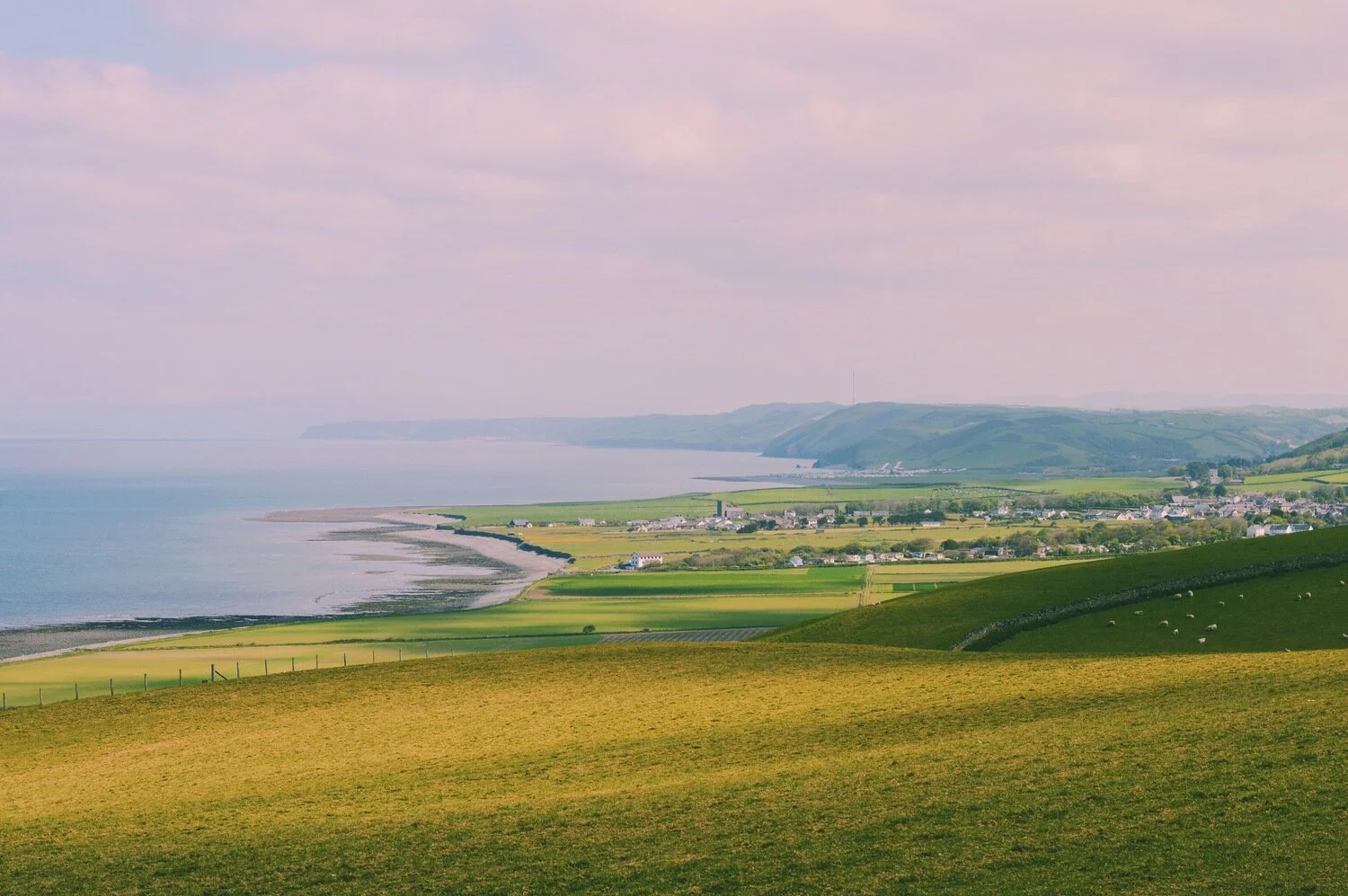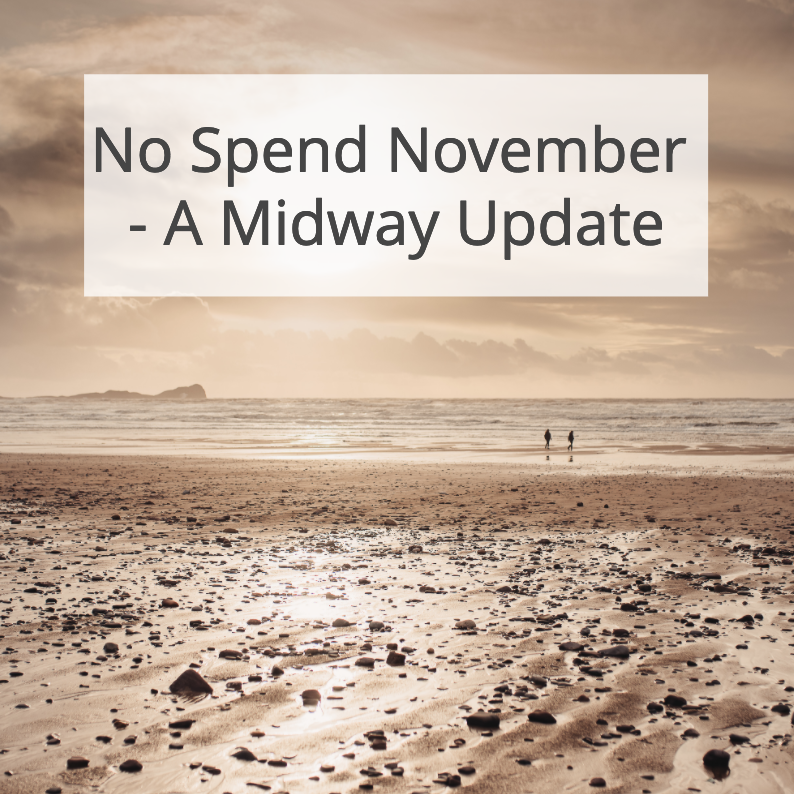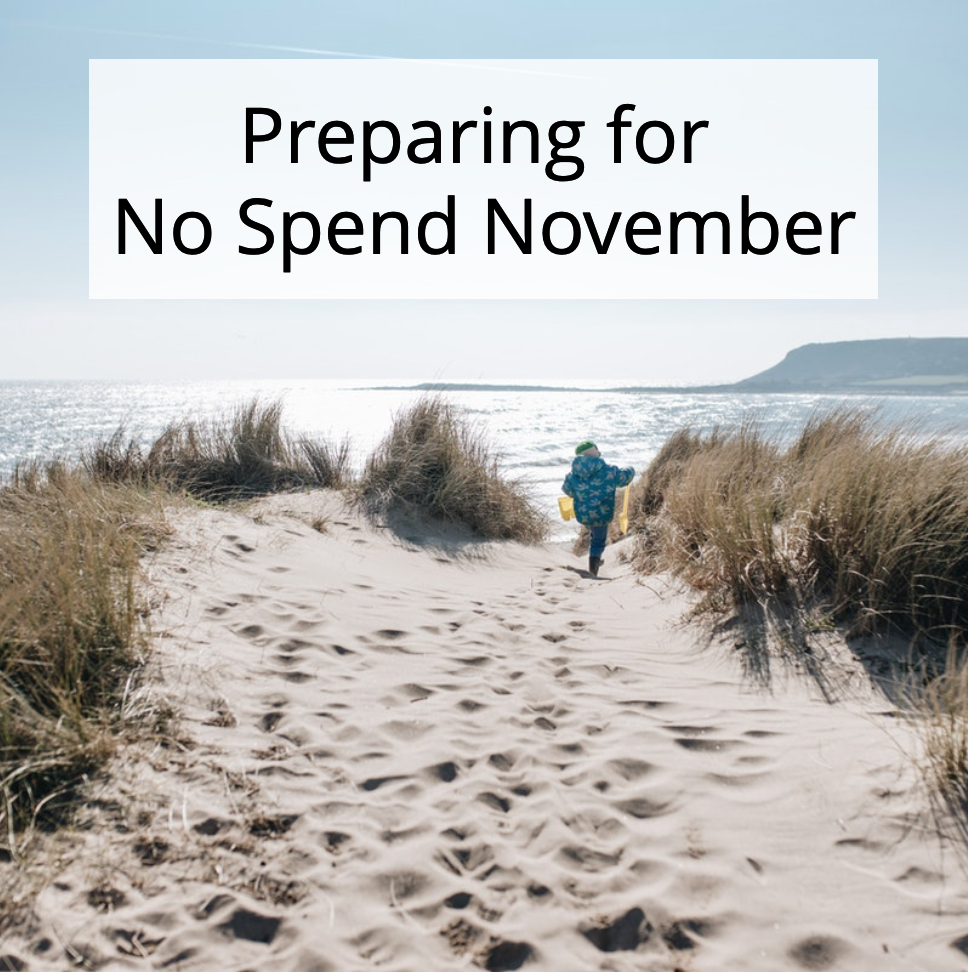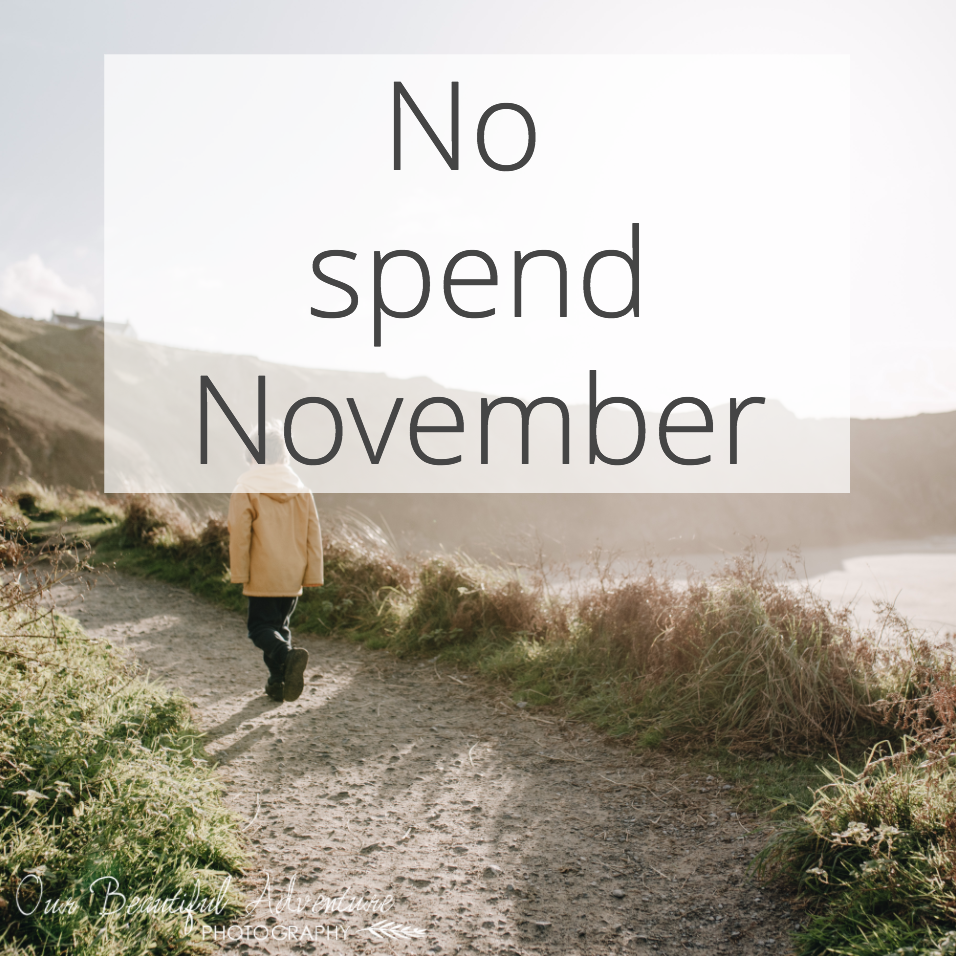Preparing for No Spend November
For the past 4 years our family have taken part in something called “No Spend November.” I can’t remember where I first learnt about it, and I’ll admit I never bothered to research the idea extensively. I was just instantly drawn to the idea of a whole month without spending money, intrigued by the challenge it would pose, and spurred on by the amount we would save.
As much as I am a person who finds rules helpful, and struggles to break them, I am also a person who doesn’t do well with being legalistic just for the sake of it. So I’ve never bothered to look up the origins or official rules for “No Spend November” and instead each year, around this time, we sit down and decide, as a family, what it will look like for us. It’s is different every year, and we have learnt a lot along the way, so I thought it was about time I compiled all of that experience into a blog post, should you want to take on the challenge for yourself, be it for November, or a different month, or even just for a week, or a weekend!
The great thing about doing this challenge in November though, is that we can use the money we save to help pay for Christmas. I think it’s the only reason our kids put up with doing it each year, because they know it will come back to benefit them at a later date!
Acknowledging Privilege
Before I go into more detail about what No Spend November is and how it works, I must first acknowledge that we are very privileged to be able to do this. For some this is just the reality of daily life, and I don’t want this blog post to come off as missing the very real struggles people face. Whenever we have undertaken this challenge before, it has highlighted the need for change in our society, namely with the introduction of a living wage. Whilst we enjoy challenging ourselves to do No Spend November, it is not how anyone should have to go through life.
The best things in life are free - Enjoying a walk in the great outdoors.
The General Idea
First of all, we still pay all of our bills. There are some expenses that you just can’t get out of, as much as you might want to. The money we are talking about here is what we have left after all of our bills are taken care of. I’m a big fan of a spreadsheet, and so I budget our income down to the penny. We have a set amount for petrol based on a rough idea of how much we will be travelling, and we have an amount set out for the four big food shops we do in a month. Once that, and all of our bills are paid, the money we have left is our “general spending money”, and covers everything from days out, to clothes for the kids, eating out and all of those little miscellaneous things that we don’t even notice we spend money on.
That general spending money is what we are trying not to spend during a “No Spend” month. It means no cafes, no clothes, no days out that cost money (this is where our annual passes come into their own), and no coffees, or takeaways, and definitely no trips to the corner shop for just one thing, and inexplicably coming home with a bag full of other stuff you didn’t know you “needed.”
It might seem cruel, or a little unfair for our children, but I am a big believer in the best things in life being free, and if we’ve learnt anything from doing No Spend November, it’s that you don’t need to spend a lot of money to have fun.
The first year we took part we were very strict with ourselves. Too strict really. I remember having a dilemma when we needed batteries for our smoke alarm but couldn’t technically go and buy them. That is when being legalistic about these things is just plain dangerous, and obviously we went and got the batteries.
November also coincides with a lot of events and activities in the run up to Christmas that aren’t so simple to pass over, especially things like school concerts and Christmas fairs. All things that we have learnt to take into account when laying out the rules.
Another issue we often encountered was simple things like paying for a car park, and buying a drink when meeting clients for work. In a strict No Spend month these things wouldn’t be allowed, but when it’s for work it isn’t as simple to say no.
All these little things have helped shape the actual rules that we have made for ourselves for No Spend November. I will outline them below, but it is worth thinking through your own circumstances and plans, to adapt the rules to best suit you. It may seem like a cop out, or cheating, but I think being able to have a positive and successful no spend month, where you don’t give up at the first hurdle, is much more important than being so hard on yourselves that you end up miserable or fail.
The best things in life are free- enjoying a pretty view.
Our “No Spend November” Rules
Our rules also include our exceptions. As the big rule is we can’t spend any money, so over the years we have learnt which things we need to make exceptions for so that we can succeed at No Spend November.
No shopping, except for items that we couldn’t get in our weekly food shop, or food we genuinely have run out of and can’t go without until the next weekly shop. For example milk or fruit, sadly no exceptions for chocolate!
No paying for car parks unless it is for a work trip, or completely unavoidable. We tend to visit places in November that we can park for free, National Trust car parks become even more useful during no spend months.
No clothes unless it for the children and they genuinely can not go without until the end of the month. I would mostly try to do without during November or mend anything that breaks, but I know that with children it isn’t always possible.
School trips or events that cost money are exempt. (You soon learn how expensive a typical November with 3 children in school is when you aren’t spending money. All those trips, concerts and fairs soon add up!)
Emergencies are exempt. If the washing machine stopped working, or the car broke down for example, these are all things we would class as emergencies and we would obviously go ahead and get fixed.
Work expenses are exempt. In a normal (non-coronavirus) year both my Husband and I would have meetings during November for work that would usually involve buying something. We allow these exceptions in November but we aren’t allowed to take liberties. Choosing to go for lunch with a work colleague just to try and get around the rules, for example, would not be allowed. It would only be if it wasn’t socially acceptable for you in a meeting setting to not purchase something, and where possible we would try to avoid these situations or at least minimise what we were spending.
The Dinefwr Christmas Fair - This annual event only happens in November and it is a Christmas tradition of ours to go along and let the children pick a decoration each and then buy some yummy treats from the food stalls. I don’t think I could do No Spend November if we didn’t allow ourselves this one day off. Obviously this year we are still waiting to see if it will even go ahead due to covid restrictions, but in a normal year this would be our one big exception.
The mental health exception. I personally love nothing more than going for a nice walk in the outdoors with friends to catch up and to socialise, which costs me nothing, however for my Husband his interactions with his friends more often than not involve a pub or a coffee shop. We are all having to get a bit more creative this year in how we socialise with our loved ones, so I don’t know how much of an issue it will be this November, but in the past I have encouraged my Husband to forget about No Spend November and go out and see his friends if they are all meeting at a pub or cafe, as I know that spending time with friends is one of the ways that helps his mental health. Coming out of the month depressed and isolated is definitely not the goal, so if this exception is needed then so be it!
Christmas presents. Some years we haven’t allowed ourselves to do any Christmas shopping during November, and other years we have allowed ourselves to do as much as we liked. Neither worked particularly well for me. This year I am hoping to find a happy medium. I have found in the past than when we could buy only Christmas gifts it became all I thought about. I was constantly browsing for gift ideas and it wasn’t what I wanted for my No Spend experience. So this year I will only be buying presents if they are on sale, and it is an offer that is unlikely to be repeated again before Christmas. We only buy one gift for each of our children, so this makes it a much easier process anyway. I’m definitely not going to be buying things just because they are cheap! I will add that I have managed to already buy a large amount of stocking fillers (looming lockdowns got me motivated early this year!) so that will help.
The best things in life are free - A walk in the woods.
What you learn doing “No Spend November”
If you have ever been on a diet, then you will know that as soon as you restrict certain foods, they become all you think about. Similarly during a No Spend month it is very easy to find yourself thinking about spending money. Suddenly there are all of these things you wouldn’t normally notice, screaming at you to buy them. As someone who calls themselves a Minimalist, and already takes a very considered approach to any purchases I make, it really is quite a revelatory experience.
However, as someone who finds it easy to follow rules, having hard and fast restrictions in place for myself I actually find really helpful. I may want that pretty dress that facebook keeps advertising to me, but I know I can’t buy it, so I have to just scroll on by. You also don’t realise how much we placate our feelings by shopping until you can’t do it. If you feel a bit low then maybe you pick yourself up with a sweet treat, or a meal out, or a new piece of clothing. All of these things may make us feel happy for a moment, but they are not happiness, and they merely distract us from the real issues.
Deliberately stepping out of our culture of consumerism is a really refreshing change. You don’t realise how much you are being sold to everyday until you start saying no. Not to mention how much better it will be for the planet if we learn to consume less!
It will be hard, but it will teach you so much about yourself, about how easily you spend money, and how much of what we consume is unnecessary, and about the real reasons you buy what, and when, you do.
I don’t doubt for a minute that it it will be a very beneficial learning experience for anyone who dares to take it on.







